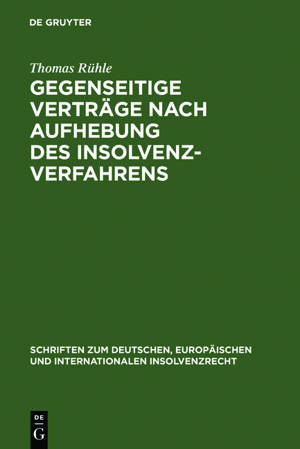
- Retrait gratuit dans votre magasin Club
- 7.000.000 titres dans notre catalogue
- Payer en toute sécurité
- Toujours un magasin près de chez vous
- Retrait gratuit dans votre magasin Club
- 7.000.0000 titres dans notre catalogue
- Payer en toute sécurité
- Toujours un magasin près de chez vous
Gegenseitige Verträge Nach Aufhebung Des Insolvenzverfahrens
Ansprüche Aus Gegenseitigen Schwebenden Verträgen Gem. § 103 Inso Nach Vollzogener Schlussverteilung (§ 200 Abs. 1 Inso) Und Rechtskräftig Bestätigtem Insolvenzplan (§ 258 Abs. 1 Inso)
Thomas Rühle
111,45 €
+ 222 points
Description
Als zentrale Vorschrift des materiellen Insolvenzrechts ist
103 InsO von hoher praktischer Bedeutung. Bei Eröffnung eines Insolvenzverfahrens hat der Insolvenzverwalter häufig über die Art der Abwicklung einer Vielzahl von gegenseitigen "schwebenden", d.h. von keiner Partei vollständig erfüllten Verträgen zu entscheiden. Dies gilt insbesondere für Unternehmensinsolvenzen. Ausdrückliche Rechtsfolgen knüpft das Gesetz an die Wahlrechtsausübung nur hinsichtlich der verfahrensrechtlichen Stellung des Vertragspartners. Darüber hinaus schweigt das Gesetz allerdings über die Rechtsfolgen, die sich aus der Ausübung bzw. Nichtausübung des Wahlrechts nach
103 InsO ergeben. Das Wahlrecht des Insolvenzverwalters ist in der Vergangenheit schon häufig Gegenstand wissenschaftlicher Arbeiten gewesen. Im Mittelpunkt dieser Untersuchungen hat indes nur die Rechtslage innerhalb des Insolvenzverfahrens gestanden. Ziel der vorliegenden Arbeit ist deshalb die Untersuchung der zwischen den Vertragsparteien bestehenden Rechtslage, nachdem das Insolvenzverfahren entweder nach vollzogener Schlussverteilung oder nach Inkrafttreten eines Insolvenzplans aufgehoben worden ist. Ausgangspunkt ist das grundlegende Spannungsverhältnis zwischen vertraglichem Schuldrecht und materiellem Insolvenzrecht und die hiermit verbundene Frage nach den Auswirkungen der Verfahrenseröffnung auf die noch offenen Erfüllungsansprüche. Der Autor stellt die Probleme dar, die sich bei Anwendung der neuesten BGH-Judikatur, nach der die Verfahrenseröffnung nur die "Durchsetzbarkeit" der Erfüllungsansprüche beeinflusst, stellen, und bietet Lösungsvorschläge an. Praxisrelevant sind insbesondere die Schwierigkeiten, die durch die Abkehr von der "Erlöschenstheorie" bei Inkrafttreten von Sanierungsinsolvenzplänen entstehen.
103 InsO von hoher praktischer Bedeutung. Bei Eröffnung eines Insolvenzverfahrens hat der Insolvenzverwalter häufig über die Art der Abwicklung einer Vielzahl von gegenseitigen "schwebenden", d.h. von keiner Partei vollständig erfüllten Verträgen zu entscheiden. Dies gilt insbesondere für Unternehmensinsolvenzen. Ausdrückliche Rechtsfolgen knüpft das Gesetz an die Wahlrechtsausübung nur hinsichtlich der verfahrensrechtlichen Stellung des Vertragspartners. Darüber hinaus schweigt das Gesetz allerdings über die Rechtsfolgen, die sich aus der Ausübung bzw. Nichtausübung des Wahlrechts nach
103 InsO ergeben. Das Wahlrecht des Insolvenzverwalters ist in der Vergangenheit schon häufig Gegenstand wissenschaftlicher Arbeiten gewesen. Im Mittelpunkt dieser Untersuchungen hat indes nur die Rechtslage innerhalb des Insolvenzverfahrens gestanden. Ziel der vorliegenden Arbeit ist deshalb die Untersuchung der zwischen den Vertragsparteien bestehenden Rechtslage, nachdem das Insolvenzverfahren entweder nach vollzogener Schlussverteilung oder nach Inkrafttreten eines Insolvenzplans aufgehoben worden ist. Ausgangspunkt ist das grundlegende Spannungsverhältnis zwischen vertraglichem Schuldrecht und materiellem Insolvenzrecht und die hiermit verbundene Frage nach den Auswirkungen der Verfahrenseröffnung auf die noch offenen Erfüllungsansprüche. Der Autor stellt die Probleme dar, die sich bei Anwendung der neuesten BGH-Judikatur, nach der die Verfahrenseröffnung nur die "Durchsetzbarkeit" der Erfüllungsansprüche beeinflusst, stellen, und bietet Lösungsvorschläge an. Praxisrelevant sind insbesondere die Schwierigkeiten, die durch die Abkehr von der "Erlöschenstheorie" bei Inkrafttreten von Sanierungsinsolvenzplänen entstehen.
Spécifications
Parties prenantes
- Auteur(s) :
- Editeur:
Contenu
- Nombre de pages :
- 180
- Langue:
- Allemand
- Collection :
- Tome:
- n° 2
Caractéristiques
- EAN:
- 9783899493030
- Date de parution :
- 15-03-06
- Format:
- Livre relié
- Format numérique:
- Genaaid
- Dimensions :
- 156 mm x 234 mm
- Poids :
- 435 g

Les avis
Nous publions uniquement les avis qui respectent les conditions requises. Consultez nos conditions pour les avis.






